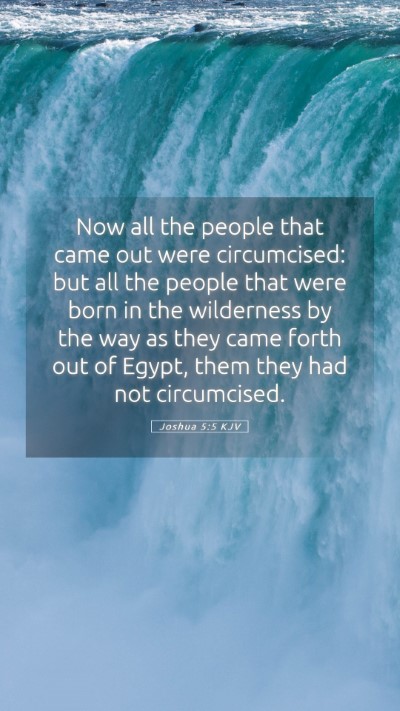Old Testament
Genesis Exodus Leviticus Numbers Deuteronomy Joshua Judges Ruth 1 Samuel 2 Samuel 1 Kings 2 Kings 1 Chronicles 2 Chronicles Ezra Nehemiah Esther Job Psalms Proverbs Ecclesiastes Song of Solomon Isaiah Jeremiah Lamentations Ezekiel Daniel Hosea Joel Amos Obadiah Jonah Micah Nahum Habakkuk Zephaniah Haggai Zechariah MalachiJoshua 5:5 Meaning
What is the meaning of Joshua 5:5?
Now all the people that came out were circumcised: but all the people that were born in the wilderness by the way as they came forth out of Egypt, them they had not circumcised.
Joshua 5:5 Bible Verse Meaning
Bible Verse Explanation of Joshua 5:5
Bible Verse: Joshua 5:5 - "Now all the people who came out of Egypt had been circumcised; but all the people born in the wilderness during the journey from Egypt had not been circumcised."
Overview
This verse is situated within the context of the Israelite's transition from the wilderness into the Promised Land. It highlights an important religious and cultural practice—the rite of circumcision, which carries deep significance in the covenant relationship between God and Israel.
Understanding the Verse
- The Context of the Journey: The reference to Egypt evokes the Israelites' liberation from bondage. According to Matthew Henry, the people who left Egypt underwent circumcision, aligning with a sign of their covenant with God.
- Circumcision as Covenant: Albert Barnes elaborates on the principle that circumcision was not merely a physical act but a spiritual marker of God’s promise and commitment to His chosen people.
- The Wilderness Generation: Adam Clarke discusses the implications for those born in the wilderness. Their lack of circumcision symbolizes a disconnect from the covenant—for while they were the descendants of the covenant people, they had not participated in its sign.
Biblical Exegesis
This verse can be understood through various lenses of biblical interpretation. The circumcision serves as a pivotal act necessary for the Israelites to fully claim their inheritance in Canaan. It emphasizes both their identity and relationship with God. Historical context reveals that those born during the exodus, unable to fulfill this command, were re-establishing their community’s covenant relationship with God.
Bringing Insights Together
By synthesizing the viewpoints of public domain commentaries, readers gain profound insights into the meaning of this scripture. Matthew Henry reminds us of the importance of obeying God's commandments, as the act of circumcision was both an external and internal commitment to holiness and service. Albert Barnes emphasizes spiritual renewal and preparation for entering their promised future. Adam Clarke teaches us about God’s mercy—the opportunity for the new generation to enter into the covenant at last. Together, these commentaries eschew a theology of evidential proof, replacing it with a relational understanding of obedience and identity.
Application of the Verse
This verse has significant applications for modern readers, particularly regarding spiritual identity and obedience to God. It invites self-examination on whether we recognize our covenant relationship with God and how we honor that commitment in our lives.
Furthermore, it raises questions about the community's role in nurturing faith. Within Bible study groups, leaders can leverage discussions on how this verse relates to modern acts of faith, making it applicable to online forums or in-person meetings.
Cross References
- Genesis 17:10-14 - The establishment of the covenant of circumcision.
- Exodus 12:48 - The requirement for circumcision to partake in the Passover.
- Leviticus 12:3 - The law of circumcision on the eighth day after birth.
- Deuteronomy 10:16 - The call for Israel to circumcise their hearts.
Conclusion
In summary, Joshua 5:5 carries with it a rich history and an essential message for understanding how God's covenant continues to be relevant in the life of believers. Through careful scripture analysis and reference to historical practices, we can appreciate the depth of this passage and its implications for our spiritual journeys.


